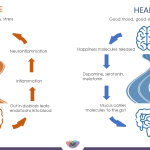In 2020, the world was held hostage by an international pandemic. While COVID-19 wreaked havoc across the globe, there is another epidemic raging that seems to have gone largely unnoticed until recently, when Naomi Osaka, a world-class tennis player, withdrew from the French and German Open, citing a need to tend to her mental health. Amid backlash from the press and other critics of her decision, a host of international athletes, advertising sponsors, and the general public have publicly defended and applauded her decision. In a Time interview about the subject, Michael Phelps said, “This will 100% save somebody’s life. That’s something bigger than we can ever imagine.”
In 2019, nearly 52 million Americans suffered from mental illnesses, but less than half of them received treatment for them. Anxiety disorders are the leading cause of mental illness among Americans, and depression is the leading cause of disability worldwide, and yet, in a recent Learn to Live Study, nearly 62% of those polled said their boss would judge them if they requested time off for mental health care. To make matters worse, it seems that the effect of the response to the COVID-19 pandemic over the last year has only increased the occurrence of anxiety and depression.
Struggling with anxiety and depression is complex. And while treatment for these diseases can be a complicated beast, there are some things you can do to help ease your symptoms and increase your mental health.
1) Take a break
Like Naomi, it is ok to say that you need a break. It’s even ok to take one! Once thought of as a euphemism for “playing hooky,” the mental health day has come to be seen as a valuable part of self-care. Your mental health is key to your creativity and productivity, and more and more employers are beginning to embrace that. Even if yours doesn’t, using your paid time off as a way to create some space for yourself when you are stressed or overwhelmed is a wise use of that time.
Breaks can be short- five minutes or five hours, or long- a six-month sabbatical, but regardless, time to reflect and rest is necessary to overall well-being.
2) Talk to someone
Having an objective sounding board is incredibly valuable in the fight against mental illness. One of the best things to come out of this global Pandemic is the normalization of tele-counseling services. Therapy and counseling services that were once out of reach financially or geographically for most people are now available at the click of a button via online counseling services like dr+on demand and better help.
3) Breathe
Chronic generalized anxiety can keep the body in “fight or flight” mode consistently, and this hypervigilance maintains a vicious cycle of stimuli that makes chronic anxiety challenging to resolve. Breathing deeply can help reset the body’s autonomic systems and ease them out of a “fight or flight” stance. If you find yourself struggling with anxiety and need help clearing your head, try 4-7-8 breathing. It’s simple. Breathe in through your nose for 4 counts, hold your breath for 7 counts, and breathe out through your mouth for 8 counts. Repeat at least three times.
4) Keep Your Serotonin Levels Up
Studies have shown that microbes in your gut actually play a huge role in your mental health. Having healthy microflora and gut bacteria can lower the symptoms of anxiety. Diet is just as important. A healthy diet of fruits, vegetables, nuts, seeds, fermented foods like kimchi or sauerkraut, with small amounts of organic dairy and meats like turkey and salmon can give your body its best chance for feeling great. Avoiding processed foods not only nourishes your brain and helps your body produce appropriate levels of “happy hormones,” but it will also help reset your gut flora to healthy levels. Taking Probiotic supplements can boost gut health and help more feel-good hormones reach your brain.
5) Exercise
Regular exercise can help lower stress levels, increase blood flow to the brain, and release endorphins that boost your mood. It also promotes the production of brain-derived neurotrophic factor, which is a neurotransmitter necessary for brain growth and cognitive function. A regular regimen of aerobic exercise can improve sleep quality and reduce your chance of getting sick or having long-term health issues.
6) Get adjusted
Chiropractic adjustments not only relieve the pain and tension that chronic stress can cause, but studies also show that they can reduce your blood pressure and other stress symptoms. Re-aligning the spine aids in returning the nervous system to balanced function, which shifts the body’s autonomic system out of “fight or flight,” triggers the release of positive hormones like oxytocin, and helps your digestive system function optimally, so you’re getting prime nutrition from all those whole foods you’re eating (see #4)!
Depression and anxiety are serious mental illnesses that require a multi-faceted approach to treatment, and one primary key to that approach is self-care. Follow the steps above, and you’ll be well on your way to optimal health- both mentally and physically!

